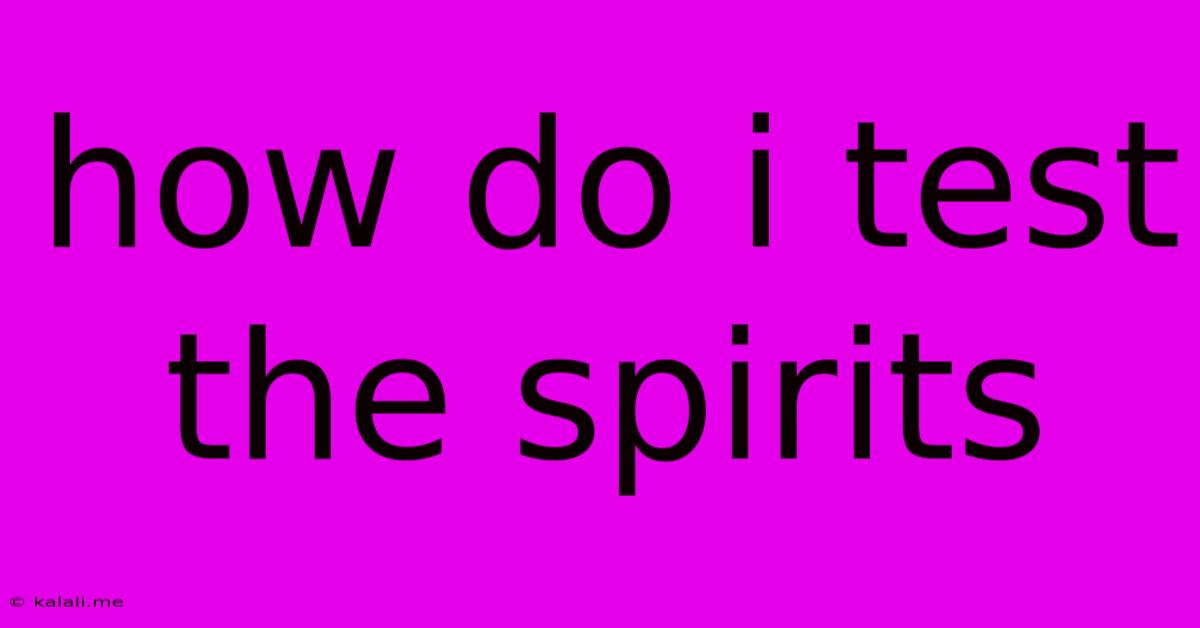How Do I Test The Spirits
Kalali
Jun 11, 2025 · 3 min read

Table of Contents
How Do I Test the Spirits? Discerning Truth from Deception
The question of how to test the spirits is a timeless one, resonating across cultures and spiritual traditions. Whether you're encountering a new spiritual teacher, evaluating a prophetic message, or simply navigating the complexities of your own intuition, the ability to discern truth from deception is paramount. This article explores practical methods for testing the spirits, drawing from various perspectives to provide a comprehensive guide. This is not about definitively proving or disproving spiritual experiences but about developing a discerning mind and a healthy skepticism.
Understanding the Context: Before diving into specific tests, it's crucial to understand the context. Are you evaluating a teaching, a person, an experience, or a message? The approach will differ depending on the source. For example, testing a spiritual teacher might involve observing their actions and examining their teachings for consistency with established ethical principles, while evaluating a spiritual experience involves introspection and self-reflection.
1. The Test of Scripture (for Christian Perspectives):
- Alignment with Biblical Teachings: Does the message or experience align with the core tenets of scripture? Does it contradict fundamental Christian beliefs? The Bible itself serves as a primary source for discerning truth.
- Fruit of the Spirit: Does the message or experience produce the "fruit of the Spirit"—love, joy, peace, patience, kindness, goodness, faithfulness, gentleness, and self-control (Galatians 5:22-23)? Genuine spiritual experiences typically foster positive character traits.
- Prophetic Discernment: If a prophetic message is claimed, is there a community of believers who can corroborate the message? Does it encourage prayer, repentance, and a deeper relationship with God?
2. The Test of Reason and Logic:
- Internal Consistency: Does the message or experience hold internal consistency? Are there logical contradictions or inconsistencies within the claims being made?
- External Consistency: Does the message or experience align with established knowledge and understanding in other fields? Are there scientific or historical inconsistencies?
- Evidence-Based Reasoning: Is there any evidence to support the claims? While spiritual experiences are often beyond empirical proof, a complete lack of supporting evidence should raise red flags.
3. The Test of Personal Experience and Intuition:
- Inner Witness: Does the message or experience resonate deeply within your heart and spirit? This inner witness, while subjective, can be a powerful indicator of truth. However, it's important to acknowledge that intuition can be influenced by biases and pre-existing beliefs.
- Gut Feeling: Pay attention to your gut feeling. A persistent sense of unease or discomfort can be a valuable warning sign.
- Spiritual Guidance: Seek counsel from trusted spiritual mentors or advisors. Their insights and perspectives can provide valuable context and help you navigate complex situations.
4. The Test of Transformation:
- Positive Change: Does the message or experience lead to positive transformation in your life? Does it improve your relationships, encourage personal growth, or foster a deeper sense of purpose?
- Spiritual Growth: Does it foster a deeper connection with your spiritual practice or beliefs? Does it enhance your spiritual awareness and understanding?
- Humility and Openness: Genuine spiritual experiences often cultivate humility and openness to new perspectives, while deceptive ones may promote arrogance or exclusivity.
Conclusion:
Testing the spirits is an ongoing process, not a one-time event. It requires careful consideration, critical thinking, and a willingness to engage with different perspectives. By combining intellectual discernment with spiritual intuition, we can cultivate a deeper understanding of spiritual truth and navigate the complexities of the spiritual world with greater wisdom and clarity. Remember to always approach the subject with humility and an open mind, recognizing the limitations of human understanding in matters of faith and spirituality.
Latest Posts
Latest Posts
-
Speed Of Computer Processor Is Measured In
Jun 12, 2025
-
How To Find Distance Between Two Lines
Jun 12, 2025
-
What Is The Difference Between A Scarcity And A Shortage
Jun 12, 2025
-
What Is The Difference Between Direct Democracy And Indirect Democracy
Jun 12, 2025
-
What Percent Is 12 Of 48
Jun 12, 2025
Related Post
Thank you for visiting our website which covers about How Do I Test The Spirits . We hope the information provided has been useful to you. Feel free to contact us if you have any questions or need further assistance. See you next time and don't miss to bookmark.